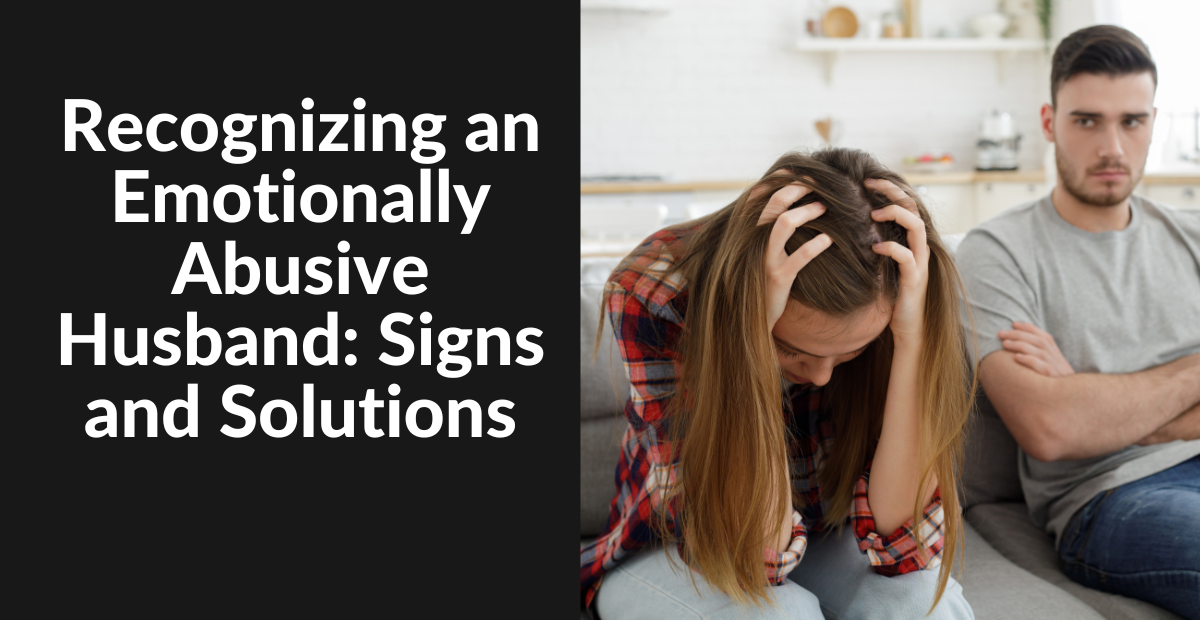Are you living with an emotionally abusive husband? Do you feel trapped and unsure of how to handle the situation? You are not alone. In this article, we will explore the signs of an emotionally abusive husband and provide guidance on seeking help.
By understanding the dynamics of emotional abuse, you can empower yourself to make positive changes in your life.
What is Emotional Abuse?
Emotional abuse is a form of domestic violence that involves manipulating, belittling, and controlling behavior aimed at undermining a person’s self-worth and independence. Unlike physical abuse, emotional abuse leaves no visible scars but can be equally damaging, if not more so.
Signs of an Emotionally Abusive Husband

10 signs of an Emotionally Abusive Husband;
1. Excessive Control
One of the most apparent signs of emotional abuse is when your husband excessively controls your daily activities.
This can manifest in various ways, such as monitoring your every move, limiting your interactions with friends and family, or even controlling your financial resources. Remember, healthy relationships are built on trust, equality, and personal freedom.
2. Constant Criticism
An emotionally abusive husband often engages in a relentless cycle of criticism, making you doubt your abilities and self-worth.
Whether it’s constant belittling, mocking, or nitpicking, this behavior erodes your confidence over time. Remember, you deserve to be valued and appreciated for who you are.
3. Verbal and Emotional Attacks
Emotional abuse frequently involves verbal attacks that aim to hurt and demean you. Your husband may use derogatory language, insults, or threats to manipulate your emotions and maintain control.
No one deserves to be treated this way. Seek support from trusted friends, family, or professionals who can help you break free from this cycle.
4. Isolation from Support Networks
An emotionally abusive husband often tries to isolate you from your support networks. He may discourage your interactions with friends, discourage your personal interests, or limit your access to social activities. By cutting you off from external support, he gains more control over your emotions and actions.
5. Intense Jealousy and Possessiveness
Jealousy and possessiveness can be signs of an emotionally abusive husband. He may constantly question your loyalty or accuse you of infidelity without any valid reasons.
This behavior not only damages trust but also creates a toxic atmosphere within the relationship.
6. Gaslighting
Gaslighting is a manipulative tactic commonly used by emotionally abusive partners. Your husband may distort facts, manipulate situations, or deny events to make you question your memory, sanity, or perception of reality. Gaslighting undermines your self-confidence and can leave you feeling confused and vulnerable.
7. Blame-Shifting
An emotionally abusive husband often avoids taking responsibility for his actions by consistently shifting blame onto you. Regardless of the situation, he finds ways to make you feel guilty, responsible, or at fault.
Remember, you are not responsible for his behavior, and nobody deserves to be constantly blamed for problems within a relationship.
8. Intimidation and Threats
Intimidation and threats create an atmosphere of fear and control within a relationship. Your husband may use intimidating gestures, angry outbursts, or threats of physical or emotional harm to maintain dominance.
Remember, your safety should always be your top priority, and no one has the right to make you feel afraid.
9. Emotional Withholding
Emotionally abusive husbands often withhold affection, appreciation, or validation as a way to manipulate your emotions and behavior.
By keeping you in a constant state of craving love and approval, they gain power and control over your emotional well-being.
10. Emotional Roller Coaster
Living with an emotionally abusive husband often feels like an emotional roller coaster. You may experience frequent mood swings, anxiety, depression, or feelings of helplessness.
It’s important to remember that you deserve to live in a stable, supportive, and loving environment.
Emotionally Abusive Husband Examples
- “You’re so stupid. I can’t believe I married someone as incompetent as you.”
- “I never said that. You’re just imagining things. You must be losing your memory.”
- “If you weren’t so lazy, I wouldn’t have to do everything around here. It’s your fault our marriage is falling apart.”
- “If you ever leave me, I’ll make sure you never see the kids again. You’ll regret it.”
- “You don’t need to see your friends. They’re all a bad influence on you. I’m the only one who truly cares about you.”
- “You don’t deserve my love. Maybe if you tried harder, I’d show you some affection.”
- “I’ll handle all the finances. You don’t need to know anything. Just trust me.”
Effects of Emotional Abuse on the Victim

Living with an emotionally abusive husband can have severe consequences for the victim’s mental and emotional well-being. Some common effects of emotional abuse include:
- Low self-esteem and self-worth
- Anxiety and depression
- Feelings of helplessness and powerlessness
- Social withdrawal and isolation
- Physical symptoms, such as headaches or stomachaches
- Substance abuse as a coping mechanism
- Development of trauma-related disorders, like post-traumatic stress disorder (PTSD)
Seeking Support: Friends, Family, and Professionals
When dealing with an emotionally abusive husband, it is crucial to seek support from trusted individuals who can provide emotional and practical assistance. Consider reaching out to:
- Friends and family: Share your experience with loved ones who can offer support, understanding, and a safe space to express your emotions.
- Support groups: Join local or online support groups for individuals who have experienced or are currently dealing with emotional abuse. These groups provide a non-judgmental environment where you can share your story and gain insights from others who have faced similar challenges.
- Therapists or counselors: Seek professional help from therapists who specialize in domestic violence. They can help you process your emotions, develop coping strategies, and explore options for your future.
Developing a Safety Plan
If you decide to leave an emotionally abusive relationship or anticipate potential escalation, having a safety plan in place is essential. Consider the following steps:
- Document the abuse: Keep a record of incidents, including dates, descriptions, and any visible injuries. This documentation can be crucial if legal action is necessary.
- Secure important documents: Gather essential documents such as identification, passports, financial records, and legal documents and keep them in a safe place outside the abuser’s reach.
- Identify safe spaces: Determine safe places where you can go in case of an emergency, such as a trusted friend’s house or a local women’s shelter.
- Establish a code word: Share a code word with a trusted friend or family member that you can use to indicate you are in immediate danger and need help.
- Keep a bag packed: Prepare an emergency bag with essentials like clothing, toiletries, medications, and copies of important documents, so you can quickly leave if needed.
Establishing Boundaries
Setting clear and firm boundaries is essential when dealing with an emotionally abusive husband. Here’s how you can establish and maintain boundaries:
- Identify your limits: Determine what behavior is acceptable to you and what crosses the line. This will help you establish clear boundaries.
- Communicate assertively: Clearly and calmly express your boundaries to your husband. Use “I” statements to avoid sounding accusatory and emphasize your needs.
- Enforce consequences: If your husband crosses a boundary, follow through with predetermined consequences. Consistency is key to reinforcing your boundaries.
- Seek professional guidance: A therapist can help you navigate the complexities of boundary-setting and provide guidance on effective communication strategies.
The Importance of Self-Care
Self-care is crucial for your well-being and recovery from emotional abuse. Here are some self-care practices you can incorporate into your life:
- Practice self-compassion: Be kind to yourself and acknowledge that you deserve love, respect, and care.
- Engage in activities you enjoy: Pursue hobbies and activities that bring you joy and provide a sense of fulfillment.
- Prioritize self-reflection: Take time to reflect on your emotions, needs, and goals. Journaling can be an effective tool for self-reflection.
- Take care of your physical health: Eat nutritious meals, exercise regularly, and ensure you get enough sleep. Physical well-being is closely linked to mental and emotional health.
- Seek professional help: A therapist can guide you in developing a personalized self-care plan and provide valuable support throughout your healing journey.
Building a Support Network
Building a support networks crucial when dealing with an emotionally abusive husband. Surrounding yourself with caring and understanding individuals can provide the strength and encouragement you need. Here’s how to build a support network:
- Reach out to friends and family: Share your experiences with trusted friends and family members who can offer support and guidance. Let them know what you’re going through and how they can help.
- Join support groups: Seek out local or online support groups specifically for individuals in emotionally abusive relationships. Connecting with others who have faced similar challenges can provide validation and a sense of community.
- Find a therapist or counselor: A professional therapist or counselor can offer valuable guidance and support. They can help you navigate your emotions, develop coping strategies, and empower you to make positive changes in your life.
- Contact helplines or hotlines: There are numerous helplines and hotlines available that specialize in assisting individuals experiencing domestic abuse. They can provide resources, guidance, and a listening ear when you need it most.
Taking Legal Action against Emotionally Abusive Husband
If you decide to take legal action against your emotionally abusive husband, it’s important to be well-informed and prepared. Consider the following steps:
- Gather evidence: Collect any evidence of the emotional abuse, such as text messages, emails, or voicemails that demonstrate the abusive behavior. Document incidents and keep a record of witnesses, if any.
- Consult with an attorney: Seek legal advice from an attorney who specializes in family law or domestic abuse. They can guide you through the legal process and help you understand your rights and options.
- Obtain a protection order: If you fear for your safety, you can request a protection order, also known as a restraining order or an order of protection. This order can legally prohibit your husband from contacting or approaching you.
- Secure your finances: If you are financially dependent on your husband, consult with an attorney to explore options for financial support or independence.
Leaving an Emotionally Abusive Husband
Leaving an emotionally abusive husband is a challenging decision, but it can lead to a healthier and happier life. Here are some steps to consider:
- Create a safety plan: Plan your exit strategy carefully to ensure your safety and well-being. Refer back to the earlier section on developing a safety plan for guidance.
- Seek professional help: Connect with a therapist or counselor who can provide guidance and support throughout the process of leaving. They can help you navigate the emotional challenges and offer strategies for building a new life.
- Build a support network: Reach out to friends, family, and support groups who can offer assistance and understanding during this transition.
- Consider temporary accommodations: If you need a safe place to stay, explore options like shelters, transitional housing, or staying with trusted friends or family members.
- Contact local resources: Research local organizations or agencies that provide support to victims of domestic abuse. They can offer resources, counseling services, and legal assistance
Last words
Recognizing the signs of emotional abuse is the first step towards reclaiming your happiness and well-being. If any of these signs resonate with your experiences, it is essential to seek help and support.
Reach out to friends, family, or professional counselors who can provide guidance and assistance. Remember, you are not alone, and there is hope for a brighter future. You deserve love, respect, and a relationship that nurtures your growth and happiness.
